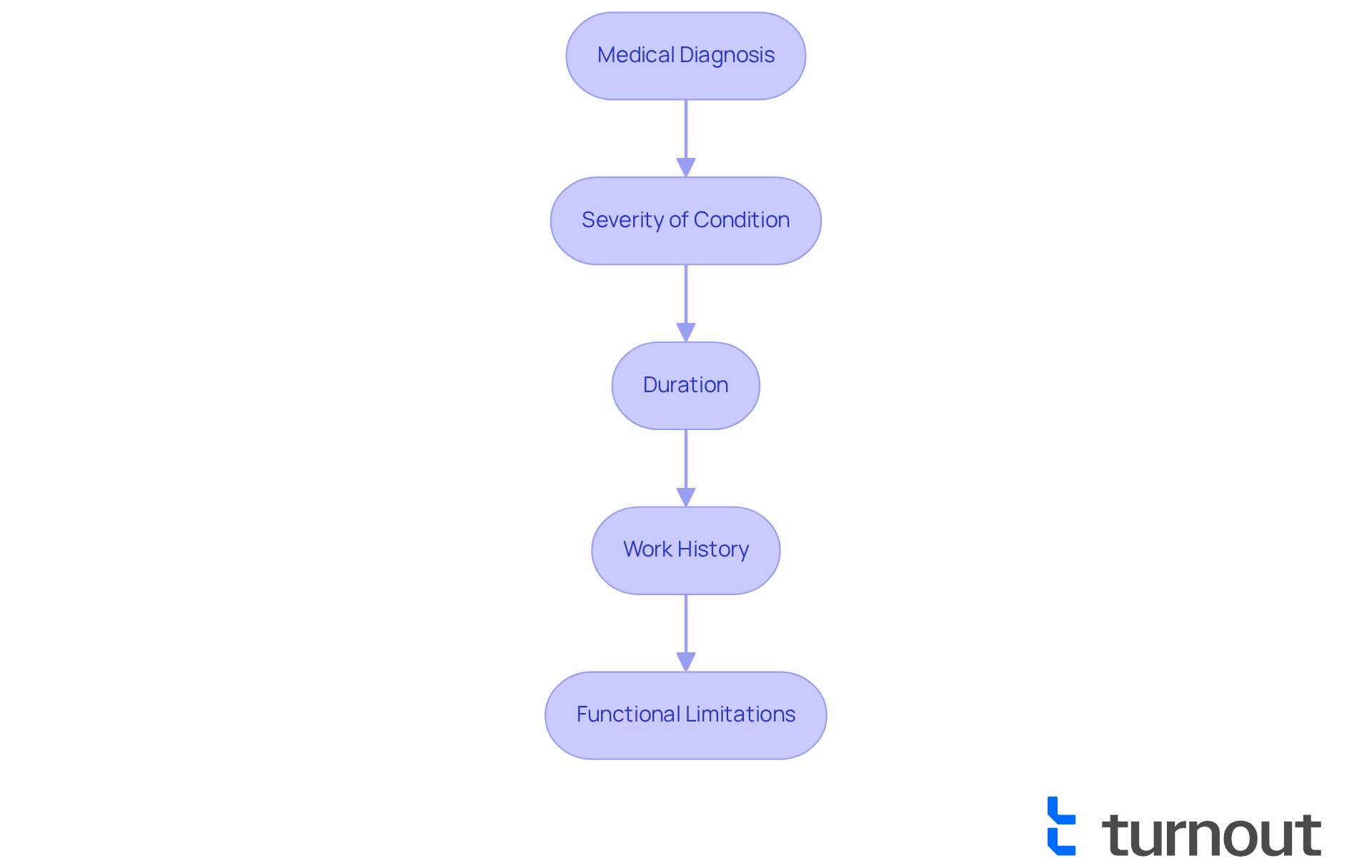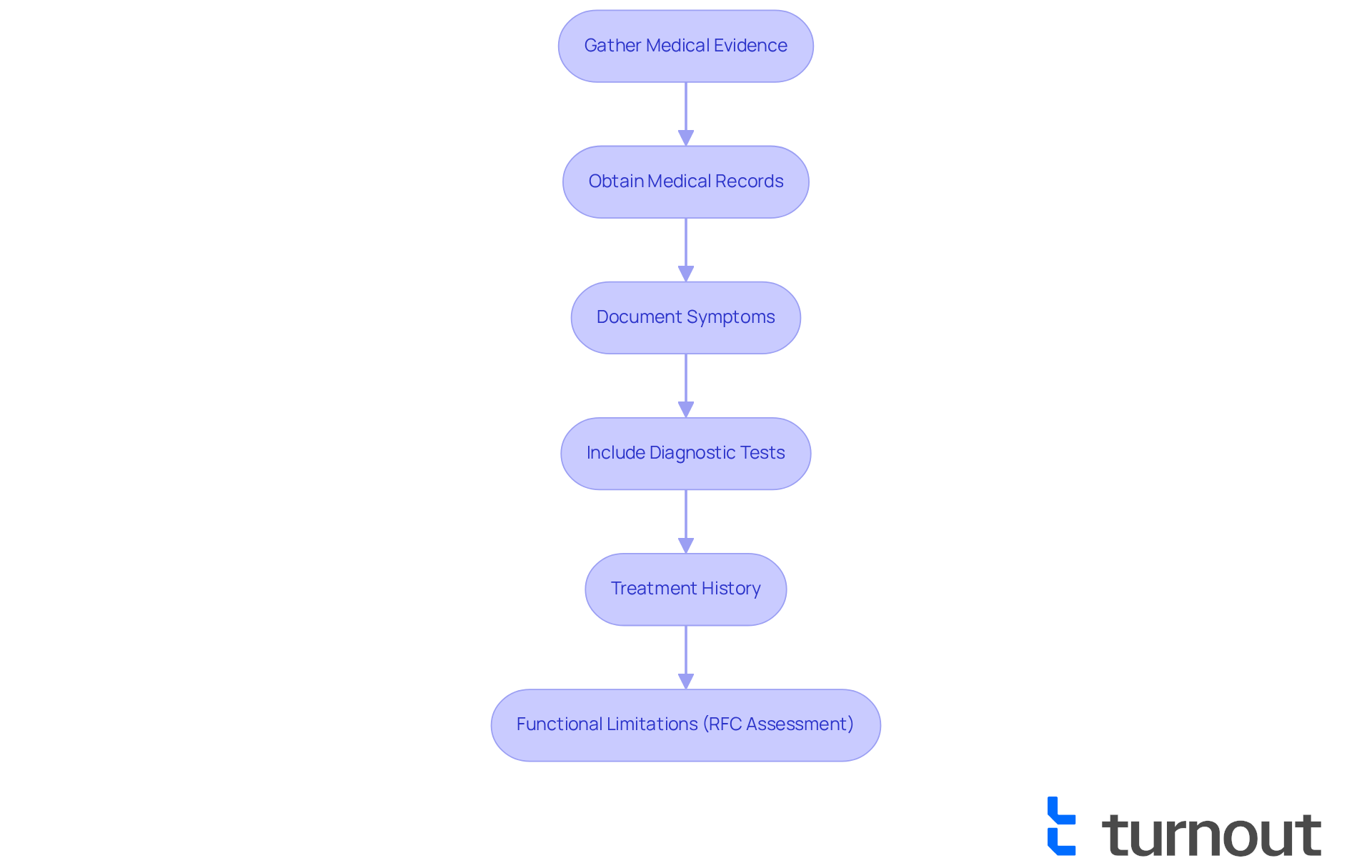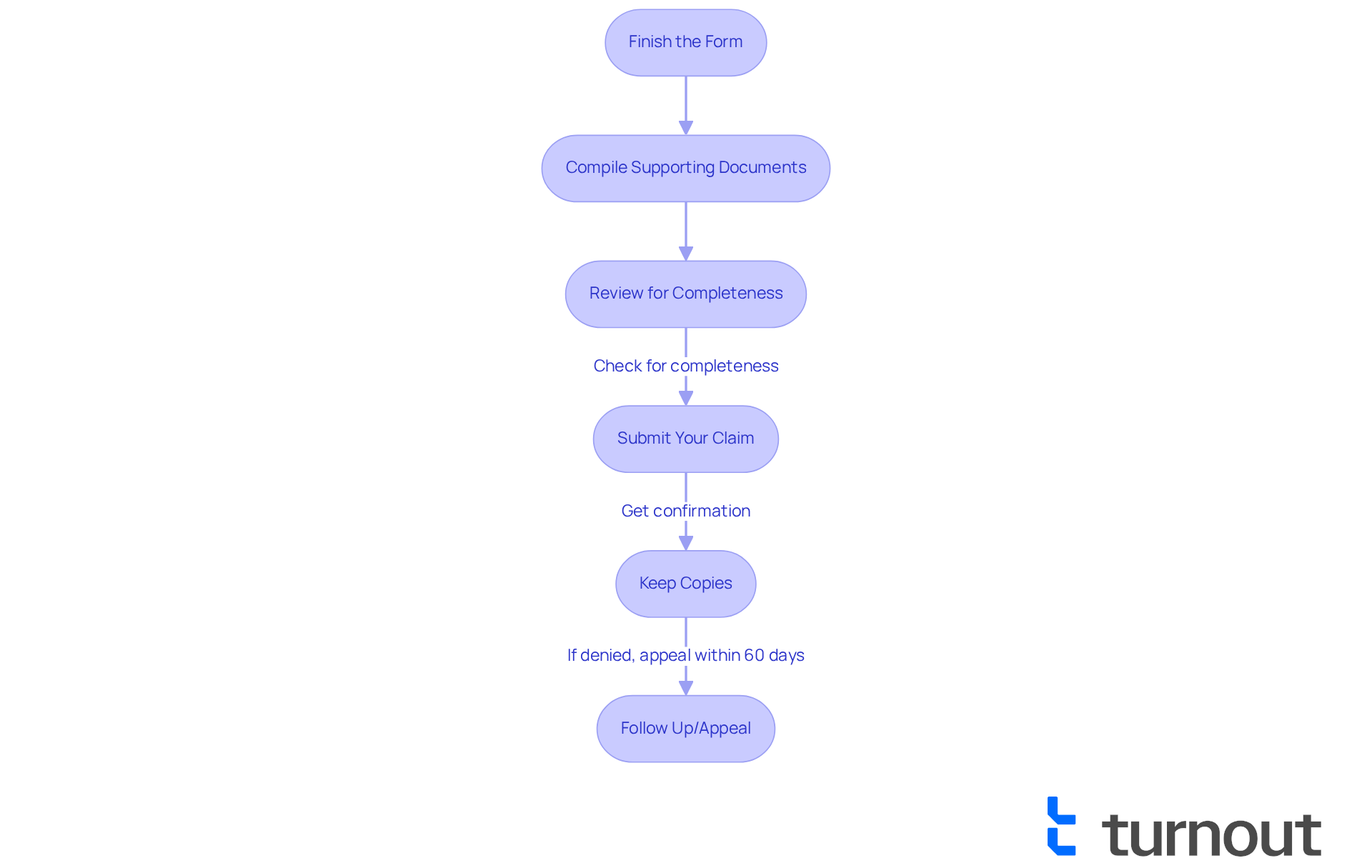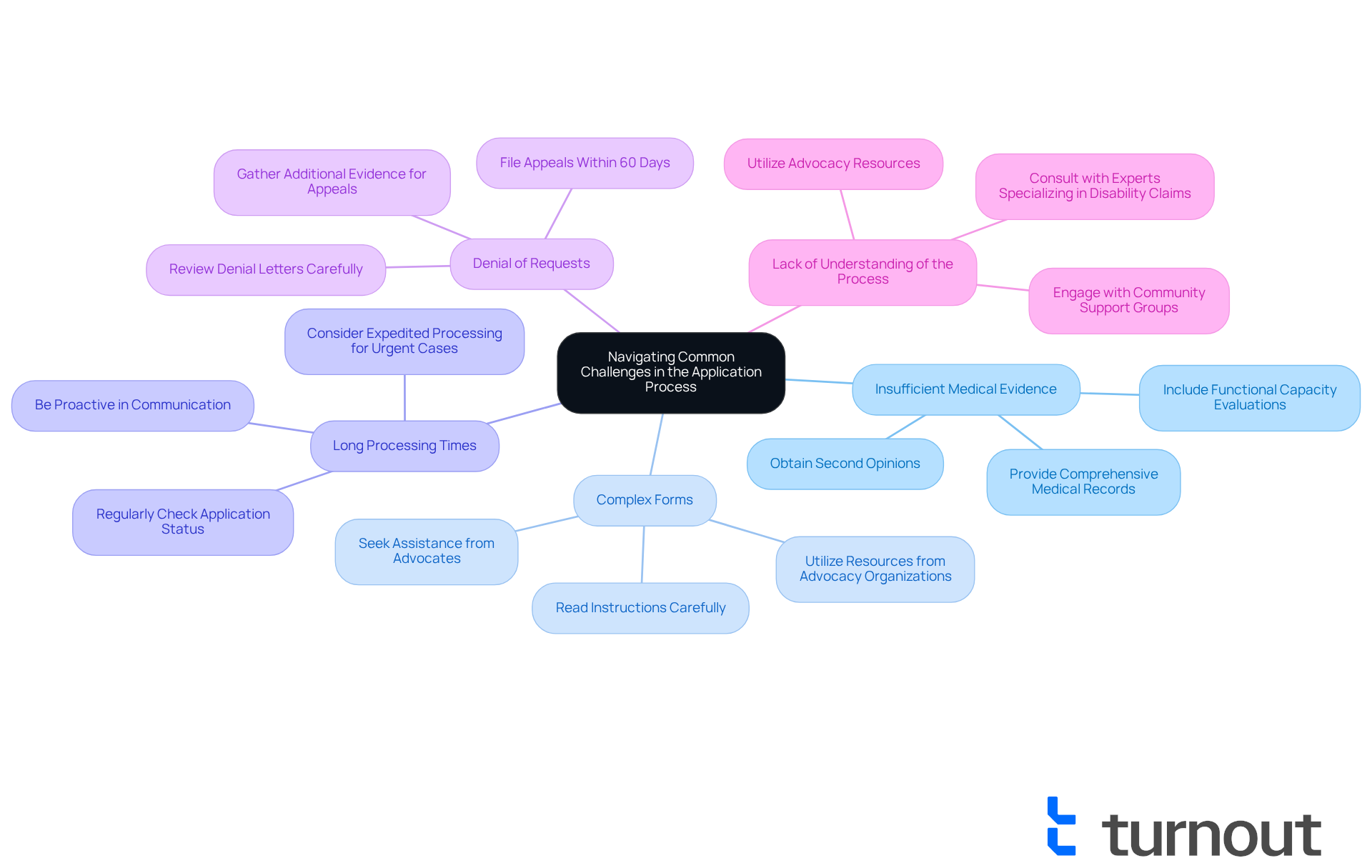Overview
If you are living with rheumatoid arthritis, you might be wondering about your eligibility for disability benefits. You can qualify if you meet specific criteria set by the Social Security Administration (SSA). This includes:
- Having a formal diagnosis
- Experiencing significant functional limitations
- Having a sufficient work history
We understand that navigating this process can be overwhelming. Providing comprehensive medical evidence is crucial for substantiating your claim. This includes:
- Treatment records
- A Residual Functional Capacity assessment, which can significantly improve your chances of approval
Remember, you are not alone in this journey. We're here to help you every step of the way. Taking action now can lead to the support you need.
Introduction
Navigating the complexities of disability benefits can be particularly challenging for individuals living with rheumatoid arthritis. This condition significantly impacts daily life and work capabilities, leaving many feeling overwhelmed. We understand that seeking support during such a difficult time can feel daunting. This article serves as a comprehensive guide, detailing the essential eligibility criteria and documentation needed to secure disability benefits for this debilitating disease.
However, many applicants grapple with the question: what are the key steps to successfully navigate the application process and overcome common obstacles? It's common to feel uncertain about where to begin. Understanding these elements is crucial for those seeking the support they need to manage their condition effectively. Remember, you are not alone in this journey, and we’re here to help you every step of the way.
Understand Eligibility Criteria for Disability Benefits
If you are navigating the challenges of rheumatoid arthritis, you may be asking yourself, can you get ? We understand that this journey is not easy, and we're here to help you through it. To determine if you can get disability for rheumatoid arthritis, specific criteria established by the Social Security Administration (SSA) must be met. Here are the key points to consider:
- : A formal diagnosis of rheumatoid arthritis from a qualified healthcare provider is essential.
- : Your condition must significantly impair your ability to perform basic work activities, including limitations in mobility, dexterity, and daily tasks.
- Duration: The impairment must be expected to last at least 12 months or result in death.
- Work History: Sufficient work credits based on your employment history are necessary to qualify for Insurance (SSDI).
- : The SSA evaluates how your condition affects your daily life and ability to work, assessing your Residual Functional Capacity (RFC). Objective medical evidence is required to validate your assertions.
It's common to feel uncertain about the process. According to SSA representatives, if your rheumatoid arthritis significantly limits your ability to work and meets the established eligibility requirements, you may wonder, can you get disability for rheumatoid arthritis? Presenting thorough medical evidence, including treatment reports and diagnostic tests, is crucial to substantiate your claim. Many requests are rejected due to inadequate documentation, so is essential.
This organization is not a legal practice and does not offer legal counsel. Instead, we provide tools and services to help you . Our trained , are here to assist you in understanding the eligibility criteria and . By utilizing our resources, you can feel more prepared for the next steps in your application process. Remember, you are not alone in this journey; we are here to support you every step of the way.

Demonstrate Medical Evidence of Rheumatoid Arthritis Progression
To support your , it is important to provide that answers the question, can you get disability for rheumatoid arthritis by illustrating its progression? We understand that this can be a challenging process, but we’re here to help you . Here’s how to do it:
- Obtain : Start by requesting copies of your medical records from all healthcare providers involved in your treatment. This includes notes from rheumatologists, primary care physicians, and any specialists who have been part of your care.
- Document Symptoms: Keep a detailed record of your symptoms. Note things like pain levels, joint swelling, and any limitations in your mobility or daily activities. This personal account is vital.
- Include Diagnostic Tests: Provide results from , MRIs, or blood tests that confirm both the diagnosis and severity of your condition.
- : Document all treatments you have undergone, including medications, physical therapy, and any surgical interventions. Be sure to include how these treatments have affected your condition. Treatment records are crucial as they show that you are actively pursuing medical assistance, which is important for your case.
- Functional Limitations: Have your healthcare provider complete a . This outlines your limitations and how they impact your ability to work.
Many valid RA disability requests are rejected at the initial application stage due to inadequate medical documentation. By compiling this evidence, you can create a and progression of your rheumatoid arthritis, which may help answer the question, can you get disability for rheumatoid arthritis? If your initial request is denied, remember that you have the right to contest the decision. This can greatly enhance your chances of obtaining the benefits you require. You are not alone in this journey, and we are here to support you every step of the way.

Gather Documentation and Submit Your Disability Claim
Once you have gathered your medical evidence, the next step is to compile your documentation and submit your . We understand that this process can feel overwhelming, but following these steps can make it more manageable:
- Finish the Form: Fill out the SSA’s form for . You can do this online, by phone, or in person at your local SSA office.
- Compile : Include the following documents with your application:
- Medical records and test results
- Treatment history and Residual Functional Capacity (RFC) assessment
- Work history and earnings records
- A personal statement detailing how rheumatoid arthritis affects your daily life and ability to work.
- Review for Completeness: Double-check that all required fields are filled out and that you have included all necessary documentation. Incomplete submissions are a frequent cause of delays or refusals, with around 43% of initial requests encountering technical denials in 2021 because of such problems. Furthermore, almost 67% of across the country, emphasizing the difficulties applicants encounter. This resource can help you manage these complexities, ensuring that your submission is as thorough and precise as possible. It is important to note that Turnout does not provide legal representation.
- : Send your request and supporting documents to the SSA. If applying online, ensure you receive a confirmation of submission. The typical processing duration for disability requests has risen considerably, with applicants awaiting an average of seven months and fifteen days for a resolution as of November 2023.
- Keep Copies: Make copies of everything you submit for your records. This will be helpful if you need to follow up or appeal a decision later. Remember, if your request is denied, you have 60 days to file an appeal, and approximately 51% of individuals who present their case at a hearing are approved.
By carefully gathering and submitting your documentation, you increase your chances of a . As pointed out by supporters, "Many individuals are denied due to or because changes in their circumstances indicate they no longer require SSDI." are here to assist you throughout this process, helping you comprehend the requirements and ensuring your submission is well-prepared. These advocates provide guidance and assistance, but they do not offer legal representation.

Navigate Common Challenges in the Application Process
Navigating the procedure for raises the question, can you get , and can indeed feel daunting. We understand that many face along the way, and we’re here to help you overcome them with effective strategies.
- : It's disheartening to know that a significant percentage of claims—approximately 65-70%—are denied due to inadequate medical documentation. To enhance your submission, be sure to provide comprehensive medical records that include detailed treatment notes and functional capacity evaluations. If you feel uncertain, consider obtaining a second opinion to strengthen your case.
- Complex Forms: The SSA requests can often be intricate and overwhelming. Take your time to read the instructions carefully, and don’t hesitate to seek assistance from knowledgeable advocates. Many organizations employ trained non-professionals who can help clarify the process and ensure your application is complete. Please remember, this organization is not a legal practice and does not offer legal counsel.
- : We know that the SSA can take several months to handle requests, with the average wait for an initial decision being around 232 days. While patience is essential, being proactive is equally important. Regularly check the status of your application online or by contacting the SSA to stay informed.
- Denial of Requests: If your request is rejected, please don’t be discouraged. Carefully review the denial letter to understand the reasons behind it. Remember, of a denial. Many successful requests emerge from appeals, so your persistence can truly pay off.
- Lack of Understanding of the Process: It’s common for applicants to feel overwhelmed by the complexities of the system. Utilize resources available through or consult with experts who specialize in disability claims to find out if you can get disability for rheumatoid arthritis and guide you through the process. Engaging with these resources can significantly improve your chances of success. Additionally, for , Turnout works with IRS-licensed enrolled agents who can provide support in that area.
As Christy, a dedicated disability advocate, emphasizes, " can help you avoid these pitfalls and significantly improve your chances of approval."
By being aware of these challenges and preparing accordingly, you can enhance your chances of successfully obtaining the disability benefits you deserve.

Conclusion
Understanding the eligibility for disability benefits due to rheumatoid arthritis is essential for those facing this challenging condition. We recognize that the journey to obtaining such benefits can be complex, but it is navigable with the right knowledge and resources. Meeting the specific criteria set by the Social Security Administration (SSA), like providing comprehensive medical documentation and demonstrating significant functional limitations, is crucial for a successful claim.
Throughout this article, we have outlined vital steps, including:
- The importance of obtaining a formal medical diagnosis
- Documenting the progression of the disease
- Compiling thorough evidence to support your application
It's common to feel overwhelmed, especially since many claims are denied due to insufficient documentation. Therefore, gathering all necessary medical records, treatment histories, and personal statements that detail how rheumatoid arthritis impacts daily life is vital. Additionally, understanding common challenges, such as complex forms and lengthy processing times, can help you prepare more effectively.
Ultimately, persistence and preparation are paramount in the pursuit of disability benefits for rheumatoid arthritis. Engaging with advocates and utilizing available resources can significantly improve your chances of approval. While the path may be fraught with obstacles, remember that with determination and the right support, you can successfully navigate the disability claim process and secure the assistance you need to manage your condition. You're not alone in this journey, and we're here to help.
Frequently Asked Questions
What is the first requirement to qualify for disability benefits for rheumatoid arthritis?
A formal diagnosis of rheumatoid arthritis from a qualified healthcare provider is essential.
How does the severity of rheumatoid arthritis impact eligibility for disability benefits?
The condition must significantly impair your ability to perform basic work activities, including limitations in mobility, dexterity, and daily tasks.
What is the duration requirement for a disability claim related to rheumatoid arthritis?
The impairment must be expected to last at least 12 months or result in death.
What work history is needed to qualify for Social Security Disability Insurance (SSDI)?
Sufficient work credits based on your employment history are necessary to qualify.
How does the Social Security Administration (SSA) evaluate the impact of rheumatoid arthritis on daily life?
The SSA assesses how your condition affects your daily life and ability to work by evaluating your Residual Functional Capacity (RFC) and requires objective medical evidence to validate your claims.
What type of documentation is crucial for a successful disability claim for rheumatoid arthritis?
Thorough medical evidence, including treatment reports and diagnostic tests, is crucial to substantiate your claim.
Why might disability claims for rheumatoid arthritis be rejected?
Many requests are rejected due to inadequate documentation, so ensuring your application is comprehensive is essential.
Can I receive legal advice regarding my disability claim for rheumatoid arthritis?
This organization does not offer legal counsel; it provides tools and services to help you navigate the process and understand eligibility criteria.




